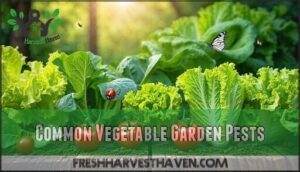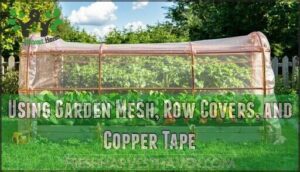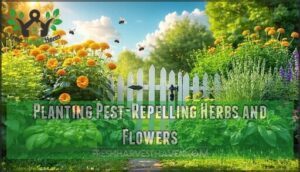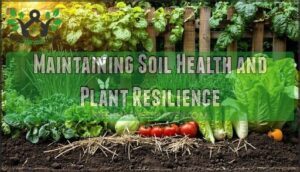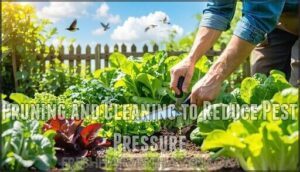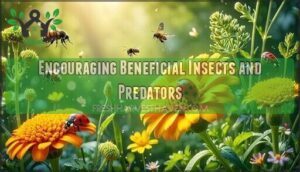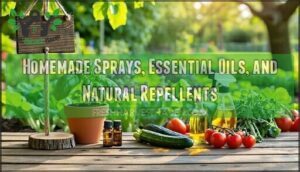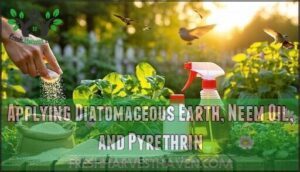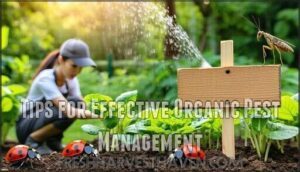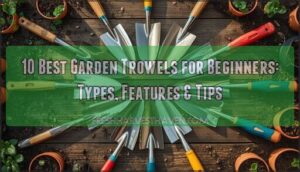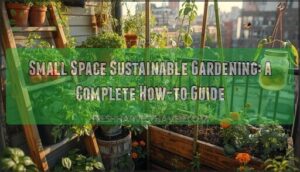This site is supported by our readers. We may earn a commission, at no cost to you, if you purchase through links.
 You can keep your vegetable garden pest-free using organic pest control methods that work without synthetic chemicals.
You can keep your vegetable garden pest-free using organic pest control methods that work without synthetic chemicals.
Start with physical barriers like row covers and copper tape around beds to block slugs and aphids. Plant marigolds and nasturtiums nearby—they’re natural pest deterrents that actually work.
Hand-pick larger pests like cabbage worms and Japanese beetles in the early morning when they’re sluggish. Encourage beneficial insects by avoiding broad-spectrum treatments and providing habitat with diverse plantings.
Homemade garlic-soap sprays handle soft-bodied pests, while diatomaceous earth creates a barrier against crawling insects. The secret lies in combining several methods rather than relying on just one approach to achieve effective pest control and maintain a healthy garden with natural pest deterrents.
Table Of Contents
- Key Takeaways
- What Makes Pest Control Organic?
- Common Vegetable Garden Pests
- Physical and Cultural Pest Prevention
- Natural and Organic Pest Control Methods
- Tips for Effective Organic Pest Management
- Frequently Asked Questions (FAQs)
- What is the best organic pesticide for vegetables?
- How do I get rid of bugs in my garden organically?
- What do organic farmers use for pest control?
- How do I keep my vegetable garden pest free?
- How can companion planting benefit garden pest control?
- What are the signs of pest-resistant vegetable varieties?
- How do weather conditions influence pest populations?
- What are effective crop rotation strategies for minimizing pests?
- How do beneficial nematodes target soil-dwelling pests?
- How often should organic treatments be reapplied?
- Conclusion
Key Takeaways
- Combine multiple organic methods – You’ll get better results using physical barriers, beneficial insects, and natural sprays together rather than relying on one approach alone
- Start with prevention first – You can stop most pests by using row covers, planting companion herbs like marigolds and basil, and maintaining healthy soil that creates stronger, more resistant plants
- Hand-pick and encourage natural predators – You’ll control pests effectively by removing them manually during morning hours and attracting ladybugs, lacewings, and birds with diverse plantings
- Monitor regularly and adapt your strategy – You need to check your garden daily during peak season, identify specific pests before treating, and adjust your organic methods based on weather conditions and what you observe
What Makes Pest Control Organic?
When you choose organic pest control, you’re using methods that comply with USDA organic standards, which prohibit synthetic pesticides and require naturally-derived alternatives.
Unlike conventional pest control that relies on chemical sprays, organic approaches focus on prevention, beneficial insects, and approved natural substances like neem oil or diatomaceous earth.
Definition and Certification of Organic Practices
In organic pest control, you’ll follow strict organic standards that ban synthetic pesticides and GMOs.
The certification process requires three years of chemical-free land management before earning USDA guidelines approval.
Farm regulations mandate detailed recordkeeping and annual inspections to maintain organic labels.
This organic certification guarantees your organic farming practices and organic gardening methods meet natural pest control requirements.
To learn more about the certification process, farmers can review the organic certification guidelines to guarantee compliance with USDA standards.
Differences Between Organic and Conventional Pest Control
Unlike conventional methods that rely on synthetic chemicals, organic pest control methods work with nature’s own systems.
You’ll use beneficial insects, natural repellents, and cultural practices instead of harsh pesticides.
While chemical-free approaches may require more patience and monitoring, they protect your family’s health and support sustainable gardening practices.
Integrated pest management combines multiple organic strategies for effective, long-term control.
This approach often involves understanding organic gardening methods to create a balanced ecosystem for long-term control.
Organic Labeling and Regulatory Standards
Understanding certification empowers you to choose truly organic pest control products.
When you see the USDA Organic Seal, you’re getting products that meet strict regulatory compliance standards.
The certification process requires detailed documentation and annual inspections.
Look for clear organic labeling and certification on pest control products – this guarantees they follow organic food production guidelines and USDA certification requirements, ensuring you get products that are truly organic.
Common Vegetable Garden Pests
You’ll recognize these common garden invaders by their telltale damage patterns and physical characteristics.
Knowing what you’re up against helps you choose the most effective organic control method for each pest.
Identifying Slugs, Snails, and Aphids
Three major pests threaten your vegetable garden.
Slugs appear as soft-bodied, gray mollusks leaving shiny mucous trails and creating ragged holes in leafy greens.
Snails carry coiled shells and produce similar damage patterns.
Aphids cluster as tiny, pear-shaped insects on leaf undersides, causing yellowing and sticky honeydew residue.
Regular garden inspection reveals these pests through their distinctive signs and feeding damage.
Recognizing Cabbageworms, Squash Bugs, and Vine Borers
Cabbage worms leave telltale holes in leafy greens, while squash bugs cluster on stem bases creating wilted patches.
Vine borers tunnel into stems, causing sudden plant collapse. These garden pest control challenges require quick bug identification for effective organic pest solutions.
- Cabbage Pests: Look for white butterflies laying eggs on brassicas
- Squash Control: Check for bronze eggs on leaf undersides
- Vine Care: Watch for sawdust-like frass near stem holes
- Pest Prevention: Monitor plants weekly during growing season
Dealing With Japanese Beetles and Grasshoppers
Japanese beetles and grasshoppers can devastate your vegetable garden in different ways.
These destructive pests can wipe out your harvest in days without proper organic defenses
These metallic green pests and jumping insects require targeted organic approaches for effective control.
| Pest | Identification | Organic Control Method |
|---|---|---|
| Japanese Beetles | Metallic green/copper bodies, cluster feeding | Beetle traps, hand-picking, neem oil sprays |
| Grasshoppers | Large jumping insects, chewing damage | Grasshopper barriers, row covers, beneficial birds |
Deploy beetle traps away from crops to avoid attracting more pests.
Use organic sprays containing pyrethrin for immediate knockdown.
Install grasshopper barriers around vulnerable plants, and encourage natural predators like birds through habitat creation for sustainable biological pest control.
Effective vegetable pest management involves understanding integrated pest strategies to minimize damage and promote a healthy garden ecosystem.
Physical and Cultural Pest Prevention
You can stop many vegetable pests before they ever reach your plants by creating physical barriers and using smart cultural practices.
These prevention methods work around the clock to protect your crops while building stronger, more resilient plants that naturally resist pest problems.
Using Garden Mesh, Row Covers, and Copper Tape
Physical barriers create your first line of defense against garden pests.
Row covers made from lightweight fabric protect seedlings from flying insects while allowing sunlight through. Garden mesh screens block larger pests like cabbage moths from reaching your plants.
Copper tape around raised beds repels slugs and snails – they won’t cross the metal barrier.
These organic farming techniques provide effective vegetable pest management without chemicals.
For maximum protection, using garden mesh screens can be a highly effective method to prevent pest damage.
Planting Pest-Repelling Herbs and Flowers
Smart companion planting transforms your vegetable garden into a natural pest control system.
Marigolds repel aphids and nematodes while attracting beneficial ladybugs. Nasturtiums act as trap crops, drawing squash bugs and cucumber beetles away from your vegetables.
Aromatic herbs like basil, chives, and rosemary mask vegetable scents, confusing pests and reducing damage by up to 35%.
Effective companion planting strategies can enhance the overall health and productivity of your garden, making it a more effective and productive space.
Maintaining Soil Health and Plant Resilience
Healthy soil creates your strongest defense against garden pests.
Strong plants naturally resist pests – invest in your soil first
Build soil fertility through regular compost management and organic mulching with straw or leaves.
Practice crop rotation annually to break pest cycles and maintain microbial balance.
Well-nourished plants resist attacks better than stressed ones, and rich soil supports beneficial organisms that naturally control harmful insects.
Reducing your need for organic pest control methods in your natural gardening system is a key benefit, as it allows for a more holistic approach to gardening.
Pruning and Cleaning to Reduce Pest Pressure
Regular pruning and garden hygiene create your first line of defense against pest invasions. Remove damaged leaves, fallen fruit, and dead plant material promptly – these attract insects and harbor diseases.
Clean your pruning tools between plants to prevent spreading problems. Proper crop sanitation and weed management eliminate pest hiding spots while maintaining soil preparation standards.
These organic gardening methods reduce pest pressure naturally, and by following these steps, you can ensure proper crop sanitation and maintain a healthy garden through garden hygiene.
Natural and Organic Pest Control Methods
When prevention isn’t enough, you’ll need active organic pest control methods that work with nature instead of against it.
These proven techniques target pests effectively while keeping your vegetables safe to eat and your garden ecosystem healthy.
Hand-Picking and Relocation Techniques
Sometimes the simplest pest control methods work best.
Hand picking offers immediate pest removal without chemicals or fancy equipment. This organic relocation approach lets you tackle visible pests directly while protecting beneficial insects.
Here are three effective hand-picking techniques:
- Morning collections – Gather slugs and caterpillars when they’re most active
- Shake-and-catch method – Use a sheet under plants to catch falling beetles
- Twilight hunts – Target nocturnal pests like cutworms during evening hours
These pest trapping and relocation methods form the backbone of natural gardening methods, giving you complete control over garden pest solutions.
Encouraging Beneficial Insects and Predators
Many beneficial insects act as natural pest control agents in your garden.
Attract ladybugs, lacewings, and predatory wasps by planting diverse flowers like marigolds, yarrow, and dill.
These biological control methods create eco friendly pest solutions without harmful chemicals.
Support pollinator habitats with native plants to maintain natural gardening balance and encourage predator attraction for effective organic vegetable gardening.
By using natural pest management techniques, gardeners can reduce their reliance on chemical pesticides and create a healthier environment for their plants.
Homemade Sprays, Essential Oils, and Natural Repellents
Beyond expensive sprays, your kitchen holds powerful pest-fighting ingredients.
Mix one tablespoon mild soap with water for an effective soap solution against aphids. Garlic spray and hot pepper blends repel various insects naturally.
Essential oils like basil repellent work wonders too. These non toxic pesticides support organic vegetable gardening while keeping your pest management techniques eco friendly.
Using an organic pest spray can also be a viable option for controlling pests in your garden, making it an effective way to maintain an eco friendly approach.
Applying Diatomaceous Earth, Neem Oil, and Pyrethrin
Throughout your organic farming journey, diatomaceous earth acts like nature’s glass shards, slicing soft-bodied pests while remaining harmless to you.
Neem oil disrupts insect hormones and feeding patterns. Pyrethrin spray delivers quick knockdown power against flying pests.
These natural pesticides form your eco-friendly arsenal for effective pest management techniques in vegetable garden care. For ideal results, understanding the natural diatomaceous earth benefits is essential to creating a balanced ecosystem.
Tips for Effective Organic Pest Management
You’ll get the best results when you use multiple organic methods together rather than relying on just one approach.
Success comes from regular monitoring and adjusting your tactics based on what you observe in your specific garden conditions, which leads to success.
Combining Multiple Methods for Best Results
Effective organic pest management works like a well-orchestrated symphony – each method strengthens the others.
Integrated Pest Control combines physical barriers, biological controls, and organic strategies for maximum impact.
Your sustainable methods create multiple defense layers that pests can’t easily overcome.
- Stack row covers with beneficial insect habitats for dual protection
- Pair crop rotation with eco friendly pesticides for season-long control
- Combine hand-picking with organic farming methods for immediate results
- Use biological controls alongside cultural practices for lasting pest management
- Layer multiple organic certification process approved techniques for thorough vegetable garden care, using integrated approaches and biological controls to ensure effective and sustainable methods.
Monitoring and Adapting to Garden Conditions
Since success depends on staying one step ahead of pest problems, you’ll need to check your garden regularly and adjust your approach based on what you find.
Daily scouting during peak growing season helps catch infestations early when they’re easier to control.
Weather monitoring guides your pest forecasting efforts, while soil quality assessments inform your garden planning decisions for crop rotation strategies.
| Monitoring Method | Frequency | What to Look For |
|---|---|---|
| Visual Inspection | Daily/Weekly | Leaf damage, pest eggs, beneficial insects |
| Sticky Traps | Check every 3 days | Flying pest populations, threshold levels |
| Soil Testing | Monthly | pH levels, nutrient deficiencies, moisture |
| Weather Tracking | Daily | Temperature, humidity, rainfall patterns |
| Record Keeping | After each check | Pest counts, treatment effectiveness, trends |
Successful organic farming requires adapting your vegetable gardening tips based on real-time garden conditions.
This approach guarantees your eco friendly pesticides work effectively while maintaining pesticide free produce standards for maximum organic food benefits.
Avoiding Common Organic Pest Control Mistakes
Many gardeners jump straight to spraying without identifying the actual pest, leading to wasted effort and garden failures.
Overusing organic sprays can harm beneficial insects you’re trying to protect. Don’t assume natural equals harmless – even eco friendly treatments need proper timing and application.
Patience beats panic when building sustainable methods that support organic food benefits while reducing pesticide residues.
Frequently Asked Questions (FAQs)
What is the best organic pesticide for vegetables?
Instead of harsh chemicals destroying your garden’s delicate balance, you’ll find neem oil works wonderfully as nature’s gentle defender.
It’s safe, effective against aphids and caterpillars, and won’t harm beneficial insects when applied correctly, making it a great alternative to harsh chemicals, with nature’s gentle touch.
How do I get rid of bugs in my garden organically?
You’ll tackle garden pests naturally using beneficial insects, companion planting, neem oil, diatomaceous earth, and hand-picking. Encourage ladybugs and birds while rotating crops to break pest cycles effectively.
What do organic farmers use for pest control?
Organic farmers rely on naturally-derived pesticides, beneficial insects, crop rotation, and cover crops. They’ll use companion planting, neem oil, and diatomaceous earth to keep pests at bay without synthetic chemicals.
How do I keep my vegetable garden pest free?
Use natural predators like ladybugs and beneficial nematodes.
Plant companion crops such as marigolds and basil.
Apply neem oil or diatomaceous earth for natural pest deterrence.
Regular inspection catches problems early.
How can companion planting benefit garden pest control?
Companion planting creates nature’s own bodyguard system for your vegetables.
Strategic plant partnerships repel harmful insects while attracting beneficial predators.
Marigolds deter aphids, basil protects tomatoes, and nasturtiums act as trap crops, naturally safeguarding your harvest without chemicals, using nature’s own defense mechanisms.
What are the signs of pest-resistant vegetable varieties?
Look for thick stems, waxy leaves, and strong root systems that signal natural resilience.
Healthy varieties show minimal damage from common pests, recover quickly from attacks, and maintain steady growth even under pressure.
How do weather conditions influence pest populations?
Weather patterns directly control when pests emerge and multiply.
Warm temperatures speed up their life cycles, while humidity affects survival rates.
You’ll see population spikes after mild winters and during hot, wet summers when conditions favor rapid reproduction.
This reorganization highlights how environmental factors, such as warm temperatures, influence pest populations.
What are effective crop rotation strategies for minimizing pests?
Rotate crops by family groups—plant brassicas after legumes, then nightshades, followed by root crops.
This four-year cycle breaks pest lifecycles since insects can’t find their preferred hosts, naturally reducing infestations without chemicals, which is a result of the naturally occurring process.
How do beneficial nematodes target soil-dwelling pests?
Like nature’s underground army, beneficial nematodes hunt down soil pests with precision.
You’ll release these microscopic predators who actively seek out grub larvae, root weevils, and fungus gnats, parasitizing them from within to break pest cycles naturally, using beneficial nematodes to achieve this.
How often should organic treatments be reapplied?
Most organic treatments need reapplying every 7-14 days, but timing depends on weather, pest pressure, and product type. You’ll reapply faster after rain washes treatments away or when infestations spike.
Conclusion
Mastering organic pest control for vegetables transforms your garden from a battlefield into a thriving ecosystem.
You’ve discovered seven powerful methods that work without synthetic chemicals.
Your vegetable plants will flourish when you combine physical barriers, beneficial insects, and natural sprays.
Success comes from patience and persistence—no single method handles every pest.
Start with prevention, monitor regularly, and adapt your approach as needed.
Your garden’s health depends on this integrated strategy.

